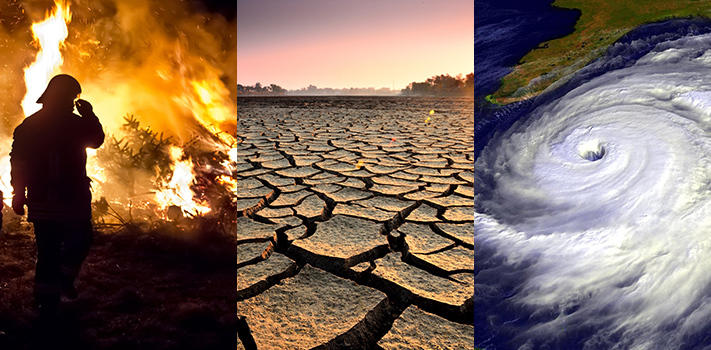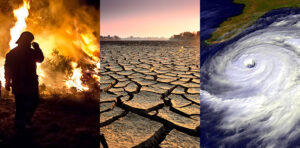Table of Contents
The abrupt change in the climate of the earth has given goosebumps to every sane person. One of the most important problems affecting our planet right now is climate change. This phenomenon is mainly attributed towards the Global Warming. The world gets warmer as a result of greenhouse gases being released into the atmosphere. Methane, nitrous oxide, and carbon dioxide are the main greenhouse gases. So, students are encouraged to know more about it and develop a scientific outlook towards climate change. That is why school ask their students to write an essay on climate change. In this article, we will learn how to write a climate change essay in English and Hindi along with sample examples.
Climate Change Essay
Climate Change Essay: We are currently dealing with a serious problem called climate change, which is caused by urbanization. Changes in climate are mostly caused by human activity. The combustion of fossil fuels for transportation, energy production, and other uses results in the atmospheric emission of copious amounts of greenhouse gases. Because trees collect carbon dioxide from the atmosphere, deforestation also plays a role in climate change. We are all concerned about the issue of climate change, and we are all affected by it. Scientists are still unsure about whether or not climate change is the only factor contributing to global warming. Due to the interconnected nature of the two issues, it can be challenging to distinguish between climate change and global warming. Controlling climate change needs to happen as soon as possible.
Here we, at adda247 are providing 10 lines of essays, short essays, and long essays on climate change.
Climate Change Essay UPSC
Introduction: Climate change is an unprecedented global crisis driven by human activities, primarily greenhouse gas emissions. Its far-reaching impacts threaten ecosystems, economies, and livelihoods worldwide. Urgent action is needed to mitigate its effects and build resilience for a sustainable future.
- Causes of Climate Change: Climate change is primarily caused by the burning of fossil fuels, deforestation, industrial processes, and agriculture. These activities release greenhouse gases, such as carbon dioxide and methane, into the atmosphere, trapping heat and leading to global warming.
- Impacts of Climate Change: Climate change has dire consequences, including rising sea levels, extreme weather events, loss of biodiversity, disruptions in agricultural patterns, and water scarcity. Vulnerable communities, especially in developing nations, face the brunt of these impacts, exacerbating poverty and migration.
- Mitigation Strategies: Mitigating climate change requires collective efforts from governments, businesses, and individuals. Transitioning to renewable energy sources, promoting energy efficiency, afforestation, and adopting sustainable practices are crucial steps to reduce greenhouse gas emissions.
Conclusion: Addressing climate change demands immediate and comprehensive action at the global level. It necessitates international cooperation, innovative policies, and sustainable practices to preserve our planet for future generations. Taking up this challenge is not a choice but an ethical imperative for humanity’s survival.
Climate Change Essay in 10 Lines
- Climate change is a terrible threat to all living things on Earth.
- Since the environment has changed, the traditional meaning of the word “climate” has become meaningless. The timing of weather changes is unpredictable.
- Overuse of fossil fuels, deforestation, and the exploitation of all other natural resources are the main contributors to climate change.
- The effects of climate change are not pleasant; they include rising temperatures, glaciers melting, heavy rainfall, and frequent forest fires.
- Alarmingly, the Earth’s temperature is rising at a rate that, if it keeps going, will cause it to warm by 1 to 5 degrees Celsius within the next ten years.
- Affected negatively by climate change and global warming is agriculture.
- Climate change is significantly influenced by greenhouse gases.
- The ozone layer is decreasing day by day.
- Due to the near extinction of natural resources, we will soon need to switch to sustainable energy sources.
- The end is near if global warming and climate change are not stopped.
Climate Change Essay in 250 Words
Climate change, which is endangering life on Earth, is currently one of the most heavily debated issues worldwide. Climate change is the term used to describe a bad change in the climate and its effects on Earth’s living things. Over the last two million years, Earth’s climate has warmed, and climate change and global warming are to blame. Seasonal shifts are just one of the extreme effects of the unreasonable increase in air temperature. The main causes of global warming, which changes the climate, include deforestation, the use of fossil fuels, and other human activities.
The terrible climate changes brought on by global warming include forest fires, heavy rain, and glacier melting. In order to lead a peaceful and contented existence, we must stop global warming. The exploitation of the already-existing natural resources must stop immediately, and reforestation should be practised. In order for the planet to heal, serious problems like climate change and global warming must be addressed.
Climate Change Essay in 500 words for UPSC
According to the definition of climate, long-term periodic changes in the weather patterns that have been recorded for centuries are referred to as climate. Climate change results from the simultaneous occurrence of various changes on Earth since its creation. Climate change occurs in cycles; it began during a cooler ice age and is now much warmer than it was two million years ago. The Sun, which is the ultimate source of energy and continuously powers the weather system, is responsible for the millions of living things we see on Earth today.
To name a few major changes, the world is currently facing unjustified droughts, unpredictable weather patterns, sudden rains, and snowfall, there is a steady fluctuation in temperatures leading to tragedies like forest fires, and the weather is no longer predictable enough. The changes are unpredictable, and it is becoming more and more difficult to keep track of them. Both positive and negative effects of these changes on human lives are significant.
Since the beginning of evolution, mankind have continuously benefited from nature. This has produced Some of these include the high levels of carbon dioxide in the environment, other dangerous substances in the air and water, and the complete depletion of fossil fuels as a result of frequent use. Constant exploitation of natural resources and a lack of major action to improve the situation finally led to the buildup of hazardous gases in the atmosphere. Climate change also contributes to the ozone layer’s destruction from greenhouse gases.
These changes to the biosphere that humans have brought about are irreversible. All we can do is work to improve the biosphere as a place to live. Because it is expected that, due to an increase in greenhouse gas emissions into the atmosphere, Earth’s temperature would rise steadily over the next days, causing the extinction of life as we know it. The heat that should be emitted is trapped by greenhouse gases.
Essay on Climate Change and Its Impact
Climate change is an alarming global phenomenon that refers to long-term shifts in temperature and weather patterns on Earth. It is primarily driven by human activities, such as the burning of fossil fuels, deforestation, industrial processes, and agriculture, leading to an increase in greenhouse gas emissions. This essay delves into the devastating impact of climate change on the environment, ecosystems, and human societies.
- Environmental Impact: (a) Global Warming: The Earth’s average temperature has been steadily rising, resulting in the melting of polar ice caps and glaciers. This contributes to rising sea levels, leading to coastal erosion and the inundation of low-lying areas, threatening millions of people living in coastal regions.
(b) Extreme Weather Events: Climate change intensifies extreme weather events such as hurricanes, cyclones, floods, and droughts. These events cause widespread destruction, loss of life, and exacerbate food and water scarcity.
(c) Disruption of Ecosystems: Climate change disrupts ecosystems and affects biodiversity. Many plant and animal species are facing extinction as they struggle to adapt to rapidly changing conditions.
- Impact on Agriculture: Climate change has far-reaching consequences for agriculture and food security. Changing weather patterns and more frequent extreme events disrupt crop production, leading to reduced yields and higher food prices. This affects livelihoods and puts vulnerable communities at risk of hunger and poverty.
- Water Scarcity: Global warming leads to altered precipitation patterns, causing uneven distribution of rainfall. Some regions experience severe droughts, while others face intense floods. The resulting water scarcity affects communities, agriculture, and industries, further exacerbating conflicts over water resources.
- Health Impacts: Climate change influences the spread of diseases like malaria, dengue, and Zika, as changing temperatures and rainfall patterns create more favorable conditions for disease vectors. Additionally, extreme heat events can lead to heat-related illnesses and deaths, particularly among vulnerable populations.
The impact of climate change is undeniable and poses a significant threat to our planet’s ecosystems, human societies, and future generations. Urgent and collective action is essential to combat this global crisis. Governments must commit to ambitious emission reduction targets, promote renewable energy, and implement sustainable policies. Individuals can play their part by adopting eco-friendly practices and supporting climate-friendly initiatives. Only by working together can we mitigate the impact of climate change and create a sustainable future for all living beings on Earth.
Climate Change in India Essay
Climate change is a pressing global issue affecting countries worldwide, and India is no exception. As one of the most populous and climate-vulnerable countries, India faces numerous challenges due to changing weather patterns, rising temperatures, and extreme weather events. This essay explores the impact of climate change on India and emphasizes the importance of collective efforts to address this critical issue.
Impact of Climate Change in India:
- Rising Temperatures: India is experiencing a steady increase in average temperatures, leading to more frequent and intense heatwaves. These heatwaves have severe consequences for human health, agriculture, and water resources, particularly in densely populated urban areas.
- Erratic Monsoons: Climate change disrupts the monsoon patterns, which are crucial for India’s agricultural productivity. Irregular monsoons lead to droughts or floods, affecting crop yields, food security, and livelihoods of millions of farmers.
- Glacier Melting: Himalayan glaciers, vital sources of water for major Indian rivers, are receding due to global warming. The loss of glacial meltwater impacts downstream communities, reducing water availability and increasing the risk of water scarcity in the future.
- Sea Level Rise: With a long coastline, India is highly vulnerable to rising sea levels caused by the melting of polar ice caps. Coastal erosion, salinization of freshwater sources, and the risk of submergence of low-lying coastal areas pose significant challenges to coastal communities.
- Biodiversity Loss: Climate change threatens India’s rich biodiversity. Rising temperatures and changing habitats lead to the loss of plant and animal species, impacting ecosystems and ecological balance.
Solutions to Address Climate Change in India:
- Renewable Energy: Transitioning to renewable energy sources, such as solar, wind, and hydro power, can significantly reduce India’s carbon footprint and dependency on fossil fuels.
- Afforestation and Reforestation: Promoting afforestation and reforestation initiatives can aid in carbon sequestration, enhance forest cover, and protect biodiversity.
- Climate-Resilient Agriculture: Implementing climate-resilient agricultural practices, such as drought-resistant crops, efficient irrigation, and soil conservation techniques, can help farmers adapt to changing weather patterns.
- Water Management: Adopting sustainable water management practices and rainwater harvesting can mitigate the impact of water scarcity and enhance water security.
- Public Awareness and Education: Raising awareness about climate change and its impact is crucial for fostering public support and encouraging individual actions toward sustainability.
Climate change poses a formidable challenge to India’s economic growth, social stability, and environmental integrity. As a responsible global citizen, India must take proactive measures to mitigate greenhouse gas emissions and promote sustainable practices. Collaborative efforts among governments, communities, and individuals are essential to combat climate change, protect vulnerable populations, and secure a sustainable future for the nation and the planet.
Human Impact on Climate Change Essay
Human Impact on Climate Change Introduction
Climate change is one of the most pressing global issues of our time, with far-reaching consequences for the environment, economies, and societies. It is primarily driven by the increase in greenhouse gas emissions, and the majority of these emissions are the result of human activities. This essay examines the significant human impact on climate change, explores the causes, consequences, and potential solutions to address this critical issue.
Causes of Human Impact on Climate Change
- Burning Fossil Fuels: The combustion of fossil fuels, such as coal, oil, and natural gas, for energy production, transportation, and industrial processes, is the largest source of anthropogenic carbon dioxide (CO2) emissions. This contributes significantly to the greenhouse effect, trapping heat in the Earth’s atmosphere.
- Deforestation: The cutting down of forests for agriculture, urbanization, and logging reduces the Earth’s capacity to absorb CO2. Trees act as carbon sinks, and their removal releases stored carbon into the atmosphere, further exacerbating global warming.
- Agricultural Practices: Modern agriculture, including livestock farming and the use of synthetic fertilizers, releases methane (CH4) and nitrous oxide (N2O) into the atmosphere. These gases are potent greenhouse gases and contribute to global warming.
- Industrial Processes: The manufacturing industry emits greenhouse gases through various processes, such as the production of cement, chemicals, and other goods. These emissions are a substantial driver of climate change.
Consequences of Human-Induced Climate Change
- Global Temperature Rise: The Earth’s average temperature has been steadily increasing due to the enhanced greenhouse effect. Rising temperatures lead to various adverse effects, including more frequent and severe heatwaves.
- Melting Ice and Rising Sea Levels: Higher temperatures cause glaciers and polar ice caps to melt, resulting in rising sea levels. This can lead to coastal flooding, displacement of communities, and loss of valuable land.
- Extreme Weather Events: Climate change is linked to an increase in the frequency and intensity of extreme weather events, such as hurricanes, droughts, floods, and wildfires. These events have devastating impacts on ecosystems and human settlements.
- Ocean Acidification: Increased CO2 levels in the atmosphere also lead to higher levels of CO2 being absorbed by the world’s oceans, causing ocean acidification. This harms marine life, especially coral reefs and shellfish.
- Biodiversity Loss: Climate change disrupts ecosystems and habitats, threatening numerous species with extinction due to altered temperature and precipitation patterns.
Solutions to Mitigate Human-Induced Climate Change
- Transition to Renewable Energy: Moving away from fossil fuels and investing in renewable energy sources like solar, wind, and hydroelectric power is crucial to reducing CO2 emissions.
- Reforestation and Sustainable Land Use: Protecting and restoring forests and adopting sustainable land use practices can help sequester carbon and combat deforestation.
- Efficient Transportation: Promoting public transportation, electric vehicles, and cycling can significantly reduce greenhouse gas emissions from the transportation sector.
- Green Building Practices: Encouraging energy-efficient construction and retrofitting of existing buildings can reduce emissions from the built environment.
- International Cooperation: Global efforts, like the Paris Agreement, are essential for countries to work together to reduce emissions and limit global temperature rise.
- Individual Action: Encouraging individuals to reduce their carbon footprint through energy conservation, waste reduction, and lifestyle changes can make a significant impact.
Conclusion
Human activities are undeniably responsible for the rapid and detrimental changes in the Earth’s climate. Climate change poses a grave threat to the planet and its inhabitants, requiring immediate action at the individual, community, national, and international levels. Addressing human impact on climate change is an imperative that demands cooperation, innovation, and a commitment to sustainable practices in all aspects of life. Failure to act now could have catastrophic consequences for the future of our planet.
Paragraph on Climate Change
Climate change is one of the most pressing challenges facing our planet today. It refers to long-term shifts in global weather patterns and temperatures, primarily driven by human activities such as the burning of fossil fuels, deforestation, and industrial processes. The consequences of climate change are far-reaching and include rising global temperatures, more frequent and severe weather events, melting ice caps and glaciers, and sea level rise. These changes have significant implications for ecosystems, economies, and human societies. Climate change also exacerbates existing environmental issues, threatens biodiversity, and poses a serious risk to future generations. Addressing this crisis requires collective global efforts to reduce greenhouse gas emissions, transition to sustainable energy sources, and adapt to the changes that are already underway. It’s a complex and urgent issue that demands immediate action and a commitment to a more sustainable and environmentally responsible future.
जलवायु परिवर्तन पर निबंध 1000 शब्दों में
जलवायु परिवर्तन, जो पृथ्वी पर जीवन को खतरे में डाल रहा है, वर्तमान में दुनिया भर में सबसे अधिक बहस वाले मुद्दों में से एक है। जलवायु परिवर्तन वह शब्द है जिसका उपयोग जलवायु में खराब परिवर्तन और पृथ्वी पर रहने वाले जीवों पर इसके प्रभावों का वर्णन करने के लिए किया जाता है। पिछले दो मिलियन वर्षों में, पृथ्वी की जलवायु गर्म हो गई है, और जलवायु परिवर्तन और ग्लोबल वार्मिंग इसके लिए जिम्मेदार हैं। मौसमी बदलाव हवा के तापमान में अनुचित वृद्धि के चरम प्रभावों में से एक हैं। ग्लोबल वार्मिंग के मुख्य कारणों में, जो जलवायु को बदलते हैं, वनों की कटाई, जीवाश्म ईंधन के उपयोग और अन्य मानवीय गतिविधियों में शामिल हैं।
ग्लोबल वार्मिंग द्वारा लाए गए भयानक जलवायु परिवर्तनों में जंगल की आग, भारी बारिश और ग्लेशियर का पिघलना शामिल है। शांतिपूर्ण और संतुष्ट अस्तित्व का नेतृत्व करने के लिए, हमें ग्लोबल वार्मिंग को रोकना होगा। पहले से मौजूद प्राकृतिक संसाधनों का दोहन तत्काल बंद होना चाहिए और वनों की कटाई का अभ्यास किया जाना चाहिए। ग्रह को ठीक करने के लिए, जलवायु परिवर्तन और ग्लोबल वार्मिंग जैसी गंभीर समस्याओं का समाधान किया जाना चाहिए।
यूपीएससी के लिए 500 शब्दों में जलवायु परिवर्तन निबंध
जलवायु की परिभाषा के अनुसार, सदियों से दर्ज किए गए मौसम के पैटर्न में दीर्घकालिक आवधिक परिवर्तन को जलवायु कहा जाता है। इसके निर्माण के बाद से पृथ्वी पर विभिन्न परिवर्तनों की एक साथ घटना के परिणामस्वरूप जलवायु परिवर्तन होता है। चक्रों में जलवायु परिवर्तन होता है; यह एक ठंडे हिमयुग के दौरान शुरू हुआ और अब दो मिलियन वर्ष पहले की तुलना में बहुत गर्म है। सूर्य, जो ऊर्जा का अंतिम स्रोत है और लगातार मौसम प्रणाली को शक्ति देता है, आज हम पृथ्वी पर देखे जाने वाले लाखों जीवित चीजों के लिए जिम्मेदार हैं।
कुछ बड़े बदलावों का नाम लेने के लिए, दुनिया वर्तमान में अनुचित सूखे, अप्रत्याशित मौसम के पैटर्न, अचानक बारिश और बर्फबारी का सामना कर रही है, तापमान में लगातार उतार-चढ़ाव हो रहा है जिससे जंगल की आग जैसी त्रासदियों का सामना करना पड़ रहा है, और मौसम अब पर्याप्त अनुमानित नहीं है। परिवर्तन अप्रत्याशित हैं, और उन पर नज़र रखना अधिक कठिन होता जा रहा है। इन परिवर्तनों के सकारात्मक और नकारात्मक दोनों प्रभाव मानव जीवन पर महत्वपूर्ण हैं।
विकास की शुरुआत के बाद से, मानव जाति ने प्रकृति से लगातार लाभ उठाया है। इसने उत्पादन किया है इनमें से कुछ में पर्यावरण में कार्बन डाइऑक्साइड का उच्च स्तर, हवा और पानी में अन्य खतरनाक पदार्थ और बार-बार उपयोग के परिणामस्वरूप जीवाश्म ईंधन की पूर्ण कमी शामिल है। प्राकृतिक संसाधनों के निरंतर दोहन और स्थिति में सुधार के लिए प्रमुख कार्रवाई की कमी के कारण अंततः वातावरण में खतरनाक गैसों का निर्माण हुआ। जलवायु परिवर्तन भी ग्रीनहाउस गैसों से ओजोन परत के विनाश में योगदान देता है।
मानव द्वारा लाए गए जीवमंडल में ये परिवर्तन अपरिवर्तनीय हैं। हम बस इतना कर सकते हैं कि जीवमंडल को रहने की जगह के रूप में बेहतर बनाने के लिए काम करें। क्योंकि यह उम्मीद की जाती है कि, वातावरण में ग्रीनहाउस गैसों के उत्सर्जन में वृद्धि के कारण, अगले दिनों में पृथ्वी का तापमान लगातार बढ़ेगा, जिससे जीवन विलुप्त हो जाएगा जैसा कि हम जानते हैं। उत्सर्जित होने वाली गर्मी ग्रीनहाउस गैसों द्वारा फंस जाती है।
Found this article helpful?
Let’s connect via chat or call our senior expert counselor at +91-9625869989 to learn more about the different streams and options available. We would love it if we could add some of your insights. If you have a definite goal of scoring the highest marks, then you can resolve your doubts via our app/quizzes and youtube class assistance (https://www.youtube.com/c/Adda247School)
Related Post:




 NEET City Intimation Slip 2025 Release D...
NEET City Intimation Slip 2025 Release D...
 [Live Update] CUET PG Result 2025 @exams...
[Live Update] CUET PG Result 2025 @exams...
 UP, MP, CBSE Board Result 2025 Live Upda...
UP, MP, CBSE Board Result 2025 Live Upda...










